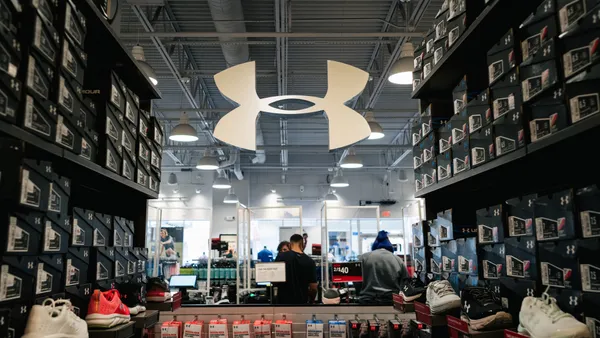Dive Brief:
-
Hudson’s Bay Co. in April 2018 will shutter its Lord & Taylor location in Skokie, IL at the Old Orchard shopping center. The 119 store associates will be offered transfer opportunities where available, Hudson's Bay spokeswoman Spencer Waybright told Retail Dive in an email.
-
Richard Baker, HBC governor, executive chairman and interim CEO, this week told analysts the company had recently sold two Lord & Taylor leases back to their landlords, generating proceeds of $23 million. "These activities are an integral aspect of our long-term strategy to highlight and realize the value of our assets," he said, according to a transcript from Seeking Alpha.
-
Those moves come as the Canadian department store company on Dec. 1 reached an agreement with hedge fund Land & Buildings Investment Management LLC, paving the way for the company’s plans to sell its New York Lord & Taylor flagship to workspace-sharing startup WeWork.
Dive Insight:
Under pressure from Land & Buildings to extract money from its real estate holdings, Hudson’s Bay appears to be turning to its Lord & Taylor unit to shed locations.
"Through the regular course of business, we continually evaluate store performance and, from time to time, may determine it necessary to close a store," Waybright said. "These decisions are never easy, but they are prudent for the company and we are committed to offering support and assistance to our team affected by the closing."
The announcement will likely please Jonathan Litt, Land & Buildings Founder & CIO, who in recent months has been adamant that the company unleash value from its real estate. "We invested in HBC because its world class real estate assets are substantially more valuable than the company's current share price," Litt said in a statement regarding the Dec. 1 peace agreement. "We appreciate our interaction with the HBC team and are pleased and encouraged that HBC's management and board continues to take steps to monetize its highly valuable real estate assets, and we look forward to continuing to work collaboratively with the company to ensure that shareholder value is maximized.”
That sounds like Litt isn’t quite done keeping the pressure on.
It’s no secret that the department model in general is under strain, as specialty stores like apparel, electronics and beauty have ransacked their departments for market share. That and a massive over-building spree decades ago has left Macy’s and Sears with too many locations, especially in the age of e-commerce. Plus, getting rid of the banner’s New York flagship — an iconic building in the grand style of department stores' golden age — is a ripping of the bandage that could make other closures much easier, suggests retail analyst Nick Egelanian, president of retail development consultants SiteWorks International.
"They were always a New York-centric company and with the deal to sell the New York flagship, that seems to be the writing on the wall," Egelanian said in an email to Retail Dive regarding Lord & Taylor. "They are actively monitoring the real estate."
That could mean yet more closings, as well as more conversions of those spaces to non-retail uses. While Lord & Taylor will retain some selling space in its flagship — and WeWork itself is reportedly interested in dabbling in retail — most of its Manhattan building will go to WeWork’s office infrastructure. But Hudson's Bay says it isn't in a hurry to give up on the unit. "HBC is committed to the Lord & Taylor banner and positioning it for future success," Waybright said in an email.
As Lord & Taylor’s physical footprint shrinks, its online position online could rise through its new, prominent place on Walmart’s e-commerce marketplace — a tie-up that gets mixed reviews from observers. When it comes to monetizing real estate, though, Lord & Taylor locations could yield HBC and its investor some decent cash. "They closed a round of stores many years ago and today really don’t have any bad real estate," according to Egelanian. "It makes sense to monetize it now ahead of additional waves of additional Macy’s, Sears and Penney’s closings."












